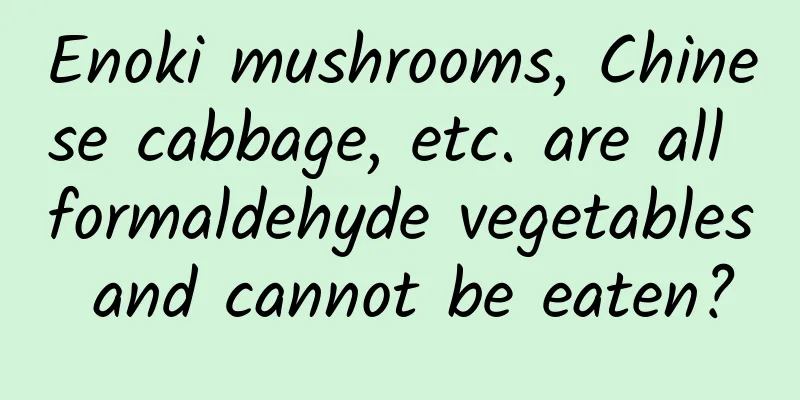Enoki mushrooms, Chinese cabbage, etc. are all formaldehyde vegetables and cannot be eaten?

|
Rumor: "Enoki mushrooms, Chinese cabbage, etc. contain formaldehyde and should not be eaten" In recent years, common vegetables such as enoki mushrooms and Chinese cabbage have been labeled as "major formaldehyde producers" online. There are rumors that eating these "formaldehyde vegetables" can damage the liver and kidneys and cause cancer. Rumor analysis: Actually, this is not the case. my country's Food Safety Law and Agricultural Product Quality Safety Law clearly stipulate that formaldehyde cannot be produced, sold or used as a food processing aid, and adding formaldehyde to food in any way is illegal. If you buy vegetables through legal and formal channels, you don't have to worry about formaldehyde exceeding the standard. In recent years, there has been a lot of discussion about "formaldehyde vegetables" on the Internet. Common vegetables such as enoki mushrooms and Chinese cabbage have been labeled as "major formaldehyde producers". There are even rumors that eating these "formaldehyde vegetables" can damage the liver and kidneys and cause cancer, which has caused many consumers to worry. For a time, the dining table seemed to be shrouded in a layer of "formaldehyde shadow", and everyone couldn't help but have doubts when buying vegetables: Could these common vegetables really be hiding a "formaldehyde crisis"? Is there really formaldehyde in vegetables? Formaldehyde is a colorless organic compound with a pungent odor. Large amounts of exposure to formaldehyde can cause varying degrees of damage to the human respiratory tract, digestive tract, circulatory system, and nervous system, and may even induce leukemia and cancer. Currently, the World Health Organization has listed formaldehyde as a carcinogen. Usually, formaldehyde is found in new furniture and newly renovated buildings. So where does the formaldehyde in vegetables come from? Formaldehyde in vegetables can be divided into two categories: endogenous and exogenous. Formaldehyde is also a product of metabolism and is produced in the metabolism of many organisms. For example, there are trace amounts of endogenous formaldehyde in vegetables, mushrooms, fruits, fish, meat, etc. Although these formaldehydes can be detected, the content is very small and basically does not cause harm to the human body. Copyrighted stock images, no reproduction is authorized Some bloggers used indoor formaldehyde test kits to detect formaldehyde from shiitake mushrooms and enoki mushrooms, causing panic among many people. In fact, most of what they detected was endogenous formaldehyde. Current research shows that edible fungi will produce trace amounts of formaldehyde according to changes in their environment, so it is normal for formaldehyde test kits to detect formaldehyde from them. This endogenous formaldehyde is usually very small, and most of it will be removed during the washing and cooking before we eat it, and will not cause any impact on our health. Exogenous formaldehyde is mainly added artificially during food processing, transportation and sales, which is also the main cause of formaldehyde pollution in vegetables. Since formaldehyde has the functions of bleaching and preserving, some unscrupulous vendors will spray diluted formaldehyde solution on the roots of vegetables to preserve them, so as to keep the vegetables white and fresh and look better when they are put on the shelves for sale. The formaldehyde-containing cabbage and formaldehyde-containing Flammulina velutipes that were exposed by reporters in secret investigations a few years ago are both of this kind. However, according to the "Food Safety Law" and "Agricultural Product Quality Safety Law" of my country, formaldehyde shall not be produced, sold or used as a food processing aid. In other words, adding formaldehyde to food in any way is illegal. Therefore, we basically don't have to worry about this problem when we buy vegetables through formal channels. The probability of "formaldehyde vegetables" appearing in the market is very low, and formaldehyde is easy to volatilize at high temperatures. Compared with harming our own health, it is actually more harmful to vendors who stay with vegetables for a long time. In addition, the cost of formaldehyde insurance is high, so few businesses choose to do such a loss-making business. In addition, formaldehyde is highly volatile and soluble in water. The trace amount of formaldehyde in vegetables will be removed during the washing and cooking process, and it is unlikely to cause harm to our health. If you are really worried, you can peel off the outermost leaves, soak them in clean water, and cook them for a few more minutes. Copyrighted stock images, no reproduction is authorized The formaldehyde content of the tape used to bundle vegetables exceeds the standard? Some people also suspect that the formaldehyde in vegetables mainly comes from the tape and plastic film used to tie the vegetables. There was once a saying on the Internet that "the formaldehyde content of vegetables tied with tape exceeds the standard by 10 times", and the enoki mushrooms and Chinese cabbage that are often tied with tape are also severely affected. In fact, this statement is also wrong. Although formaldehyde may indeed exist in the adhesive of tape, according to the Food Safety Law and related food safety standards, there are strict regulations on packaging materials and tapes that are in direct contact with food, and the formaldehyde content in them is in line with national standards. Copyrighted stock images, no reproduction is authorized Moreover, in a normal environment, plastic film and adhesive are relatively stable and will not release a large amount of formaldehyde simply by being left alone. Unless we forget to remove the tape during cooking, or put the tape and vegetables into an acidic soup, the tape may release harmful substances, but if such an accident really happens, I guess everyone will not choose to eat the dish. Therefore, there is no need to have too many misunderstandings about vegetables tied with tape. Rather than worrying about the tiny formaldehyde problem, the corruption caused by improper vegetable storage is more likely to harm our health. Whether we are selecting vegetables or storing them ourselves, we should pay more attention to it. Looking in the mirror of rumors Such rumors often have no scientific basis and exaggerate facts to create panic. In this rumor, ingredients such as enoki mushrooms and Chinese cabbage are described as containing large amounts of formaldehyde, which arouses consumers' concerns. Consumers may believe the rumors out of concern for food safety. Therefore, when facing such information, consumers should remain vigilant, make rational judgments, and verify the authenticity of the information through scientific cognition and cross-verification. Author|Hydra Science Author Review | Zhang Yu, researcher at the Chinese Center for Disease Control and Prevention, national health science expert |
<<: After thousands of years of exploring the universe, scientists finally came up with a Big Bang.
Recommend
7 essential skills for operators - Business analysis is a high-level capability for operators
1. What is business analysis capability? Business...
Hackers release jailbreak tool compatible with Apple iOS 15 and iOS 16
Apple has been working hard to improve the securi...
Alibaba front-end - sharing of three interview experiences
I hurriedly found a referral from a certain guy, ...
WeChat dedicated input method is here
According to the latest news, WeChat input method...
A year's plan begins in spring. Pay attention to these 7 points when doing spring exercises!
As the saying goes, a year's plan starts with...
Where is New Horizons? Does it also carry the coordinates of the Earth? Will it attract alien abduction?
Many people have been exclaiming that we should n...
APP front-line practical summary: How to operate a product line externally from 0 to 1?
Before I start writing, let me explain my backgro...
Google VR: Anything above 9.9 yuan is just a tax
If you ask me, do I have any special feeling afte...
Douyin operation: How to create a popular Douyin account?
Is TikTok still in its bonus period? Douyin has e...
These situations are the most likely to cause poisoning! Beware of these highly toxic wild creatures!
Audit experts: Chen Zuohong, Professor of Hunan N...
Technology Outlook 2025: The era of AI autonomy is coming, and trust is the key cornerstone
The new era of AI autonomy and the urgency of ent...
Siping Mini Program Development Company, how much does it cost to make a moving mini program?
How much does it cost to be an agent for a moving...
Finally betting on dual SIM cards and dual standby, is iPhone taking the wrong path?
Before we know it, iPhone X has been released for...
A comprehensive guide to APP promotion and operation knowledge: [Exchange]
What is exchange? n The significance of exchange ...
It’s no exaggeration, people can really be “angered to death”!
Review expert: Wu Xinsheng, deputy chief physicia...









